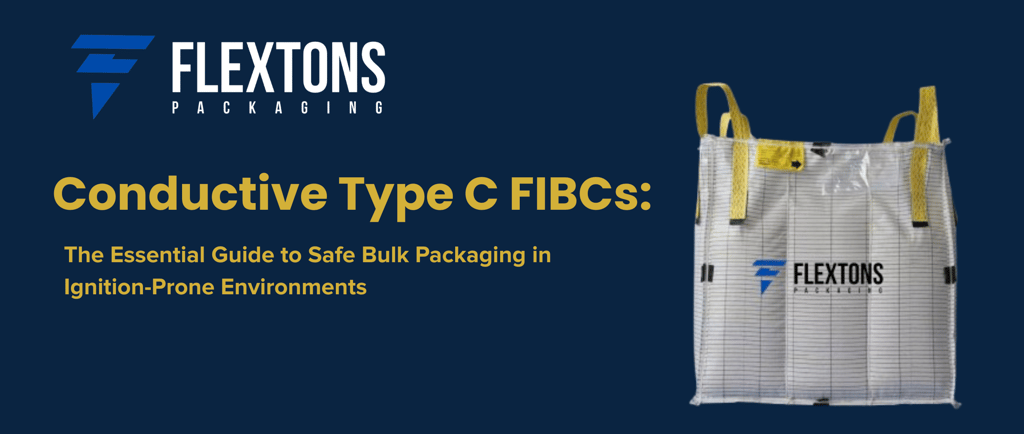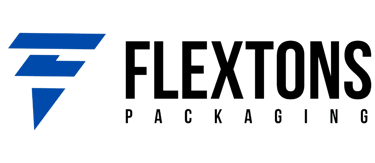Conductive Type C FIBCs: The Essential Guide to Safe Bulk Packaging in Ignition-Prone Environments


When handling bulk powders, chemicals, or combustible materials, static electricity becomes a major ignition hazard. A single uncontrolled electrostatic discharge (spark) can ignite flammable powders, vapors, or combustible dust.
This is why industries operating in hazardous zones trust Type C Conductive FIBC Bags—engineered specifically to control static electricity through safe grounding.
This guide explains everything you need to know about Type C FIBC bags, including how they work, where they are used, and how to select them correctly for your industry.
✅ What Are Type C Conductive FIBC Bags?
Type C FIBC bags, also called Conductive Jumbo Bags, are bulk bags made from conductive fabrics interwoven with carbon or other conductive yarns.
Their primary purpose is:
✔ To safely dissipate electrostatic charges to the earth through grounding.
These bags are designed for operations where the presence of static electricity can lead to explosions or fire.
Type C Bags MUST be Grounded
During filling, discharge, and handling, the grounding point must always be connected to a verified earth point.
Without grounding, Type C bags cannot provide protection.
⚠️ Why Static Electricity Is Dangerous in Bulk Packaging
Static electricity is naturally generated when powders flow:
During filling
During emptying
Due to friction between product and fabric
Due to movement and vibration during transport
If this static charge is not dissipated, it may discharge as a spark.
Spark + Powder/Dust/Vapor = Explosion Risk
Industries handling combustible or flammable powders cannot use ordinary bags.
They require Type C conductive FIBCs for safe static discharge.
Key Features of Type C Conductive FIBC Bags
✔ Conductive yarns interwoven throughout the fabric
✔ Safe discharge of electrostatic energy
✔ MUST be grounded to work effectively
✔ Prevents incendive discharges in hazardous environments
✔ Suitable for products generating high electrostatic charge
✔ Designed for ATEX Zone 1 & Zone 2 (dust/vapor) operations
✔ Available from 500 kg to 2000 kg SWL
Applications of Type C FIBC Bags
Type C bags are essential in environments where flammable dusts, powders, or vapors are present.
1. Chemicals & Petrochemicals
Perfect for static-sensitive powders:
Additives
Polymer powders
Plastic resins
Detergent powders
Hazardous chemicals
2. Food & Agro Powders
Many food powders are combustible:
Flour, starch, sugar
Milk powder
Protein powders
Spices & fine agro products
Type C ensures safe handling in explosive dust atmospheres.
3. Mining & Minerals
Used extensively for:
Metal powders
Explosive-grade minerals
Pigments & oxides
Coal dust & sulphur
4. Pharmaceuticals
For fine APIs and intermediates where explosive dust can accumulate.
5. Construction Chemicals
Safe choice for:
Cement additives
Fly ash
Silica powder
Difference Between Type A, B, C & D FIBC Bags
TypeStatic Protection LevelSuitable ForType ANo static protectionNon-flammable products onlyType BPrevents high-energy propagating brush dischargesCombustible powders without flammable vaporsType CConductive bag; must be grounded; dissipates charge safelyCombustible powders + flammable vaporsType DStatic dissipative; no grounding neededHaz hazardous zones where grounding is difficult
Type C is the safest choice where grounding is assured.
Best Practices for Using Type C Conductive FIBC Bags
To maintain safety:
✔ Always ground the bag
Use grounding cable
Verify continuity before each use
✔ Do NOT use the bag without grounding
Even one ungrounded use can cause a spark.
✔ Train operators
Proper training prevents accidental misuse.
✔ Inspect grounding points regularly
Damaged conductive threads = risk of failure.
✔ Store in safe, dry environments
Moisture can reduce conductivity.
How to Choose the Right Type C FIBC Bag
When selecting a conductive bag, check:
SWL (Safe Working Load): 500–2000 kg
S.F. (Safety Factor): 5:1 or 6:1 certified
Conductive thread continuity
Grounding point quality
IEC 61340 compliance
ATEX suitability
A reliable supplier ensures consistency, traceability, and testing.
Sustainability: Are Type C Bags Recyclable?
Yes. Type C FIBCs are made from polypropylene and can be recycled after:
Removing liners
Cleaning product residue
Removing non-PP components
Conclusion
Type C Conductive FIBC Bags are the safest bulk packaging solution for static-sensitive products.
By dissipating electrostatic charge through proper grounding, they prevent fires, explosions, and worker injuries.
Industries dealing with combustible powders, volatile chemicals, or explosive dust environments must use Type C FIBCs to meet ATEX, OSHA, and IEC 61340 safety requirements.
Choosing the right Type C bag ensures:
✔ Safer operations
✔ Compliance with global standards
✔ Protection of people, products & equipment


